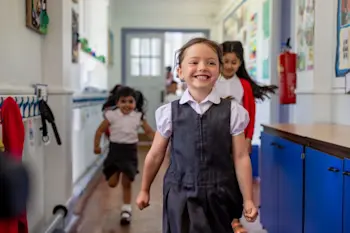How to tackle Year 2 and Year 6 SATs papers

Preparing for the SATs assessments? We take a look at the best learning and revision activities so you’ll be ready to tackle the Year 2 and Year 6 SATs Papers!
It’s that time of year again – SATs season! We know that this can be a stressful time for both children and parents. With the National Curriculum tests soon approaching, it’s time to get to grips with the maths and English assessments by understanding how to tackle SATs papers. When it comes to sitting the exams, being well prepared will help your child feel more relaxed and confident, so how can you support them?
Luckily, there’s plenty you can do to prepare for the Year 2 (Key Stage 1) or Year 6 (Key Stage 2) SATs. In this guide, we’ll break down the 2023 exam timetable, take a closer look at what each paper covers and explore the best learning activities to ace the Year 2 (KS1) and Year 6 (KS2) SATs.
Year 2 (KS1) SATs papers
Here’s what parents need to know about the English and maths KS1 SATs assessments in year 2…
When will the 2023 Year 2 SATs take place?
The Year 2 SATs will take place across schools during a flexible 2 week period in May.
Unlike Year 6 SATs, Year 2 SATs don’t have to be administered according to a nationally-set timetable in a specific week. Schools will administer the tests in the classroom in a low-stress, low-key way and some children won’t even be aware they’ve taken them!
What areas will the Year 2 SATs cover?
Your child will sit the following SATs tests;
Reading
English grammar, punctuation and spelling, or SPaG (optional paper, schools can decide whether to use it)
Maths
Year 2: reading
The reading test for year 2 children is made up of two separate papers;
Paper 1 consists of a selection of texts totalling 400 to 700 words, with questions interspersed.
Paper 2 consists of a reading booklet of a selection of passages totalling 800 to 1100 words. Children will write their answers in a separate booklet.
Each paper is worth 50% of the marks and should take around 30 minutes. Children will not be strictly timed as the tests are not intended to assess children’s ability to work at speed. The texts in the reading papers cover a range of fiction, non-fiction and poetry and get progressively more difficult towards the end of the test.
Year 2: Spelling, punctuation and grammar (SPaG)
Children taking Year 2 SATs may also sit two separate papers in spelling, punctuation and grammar;
Paper 1 is a 20-word spelling test taking approximately 15 minutes and worth 20 marks.
Paper 2 is a grammar, punctuation and vocabulary test, in two sections of around 10 minutes each (with a break between, if necessary), worth 20 marks. This will involve a mixture of selecting the correct answers through multiple choice and writing short answers.
There are a variety of question types;
Multiple choice
Ranking / ordering
Matching
Labelling
Find and copy
Short answer
Open-ended answer
Year 2 maths
The Year 2 maths test is made up of two papers;
Paper 1 is arithmetic, worth 25 marks and taking around 15 minutes.
Paper 2 is mathematical fluency, problem-solving and reasoning, worth 35 marks and taking 35 minutes, with a break if necessary. There are a variety of question types for this paper;
Multiple choice
Matching
True / false
Constrained – completing a chart or table or drawing a shape
Less constrained – have to show or explain the method
Children are not allowed to use any tools such as calculators or number lines.
How will the Year 2 SATs papers be graded?
Although the tests are set externally, they are marked by teachers within the school.
Children are given a scaled score. Their raw score – the actual number of marks they get – is translated into a scaled score, where a score of 100 means the child is working at the expected standard.
A score below 100 indicates that the child needs more support, whereas a score of above 100 suggests the child is working at a higher level than expected for their age. The maximum score possible is 115, and the minimum is 85.
Your child will receive an overall result saying whether they have achieved the required standard on the tests – you can request to be sent a results breakdown.
Top tips and learning activities to help your child prepare for their Year 2 SATs papers
Play games
Play fun games like hangman, Boggle or Scrabble or a Wordsearch with your child to support them with literacy and spelling. These activities help your children think about words in different ways and introduce new words into their vocabulary.
Use index cards
Index or flashcards are another great way to improve your child’s spelling; have them draw a picture representing a word and the first letter of that word on the front of the card. Write the full word on the back of the card. Ask your child to check the picture and write down the word on a piece of paper and spell it out loud. Have them repeat the word until they get it right.
Encourage independent reading
Reading is a key part of primary education so keep encouraging daily reading. When your child comes home from school, ask them to select a book to read on their own. When they’ve finished, get them to retell the story in their own words. This will help them gain confidence in their reading and communication skills.
Print out activity sheets
Print out and complete fun activity worksheets – our free resource hub has a range of maths and English learning activities to get stuck into!
Take a trip to the shops
Money maths questions often feature in KS1 SATs papers, so help your child become familiar with the values of different coins. Talk to them about different ways of making the same sum of money.
Make a start on times tables
The arithmetic paper your child will take in year 2 will include some basic multiplication questions. If your child is fluent in their 2x, 5x and 10x tables, they’ll have a head start.
Practise weighing and measuring
Your child will be expected to have an understanding of weights and measurements to solve problems in the maths reasoning paper. You can help them prepare by involving them in baking, weighing out the ingredients and reading the scales.
Learn to tell the time
Help your child tell the time using both an analogue and digital clock. They should be able to tell the time to within five minutes by the end of year 2. Make sure your child is confident with numbers and counting from 1 to 60 as this will make telling the time easier, and be sure to keep an analogue clock in their room for extra practice.
Year 6 (KS2) SATs papers
Here’s what parents need to know about the KS2 maths and English SATs assessments in year 6…
When will the 2023 Year 6 SATs take place?
The Year 6 KS2 SATs will be administered in the week commencing 9th May 2023.
Over the course of SATs week, children in year 6 take six different papers. These are spread across the week, with children taking a maximum of two tests per day. There is always a break between papers.
The SATs timetable runs as follows for 2023;
Tuesday:
English SPaG Paper 1: questions
English SPaG Paper 2: spelling.
Wednesday:
English reading.
Thursday:
Mathematics Paper 1: arithmetic
Mathematics Paper 2: reasoning.
Friday:
Mathematics Paper 3: reasoning.
What areas will the Year 6 SATs cover?
Your child will sit the following SATs tests;
Reading
Maths
Spelling, punctuation and grammar.
Year 6: reading
The reading test is a single paper with questions based on three passages of text. Your child will have one hour, including reading time, to complete the test.
There will be a selection of question types, including;
Ranking/ordering
Labelling
Find and copy
Short constructed response
Open-ended response.
Year 6: Spelling, punctuation and grammar (SPaG) test
Usually, the SPaG test consists of two parts: a grammar and punctuation paper requiring short answers, lasting 45 minutes, and an aural spelling test of 20 words, lasting around 15 minutes.
The SPaG test includes two sub-types of questions;
Selected response
Constructed response.
Year 6 maths
Children sit three papers in their Year 6 maths SATs;
Paper 1: arithmetic, 30 minutes
Papers 2 and 3: reasoning, 40 minutes per paper.
Paper 1 will consist of fixed response questions, where children have to give the correct answer to calculations, including long multiplication and division. Papers 2 and 3 will involve a number of question types, including;
Multiple choice
True or false
Constrained questions
Less constrained questions.
How will Year 6 (Key Stage 2) SATs papers be graded?
All year 6 SATs tests are marked externally and returned to the school. Each child is then given a scaled score ranging from 80 to 120. A score of 100 or more means that the child has achieved the expected standard.
The Department for Education expects at least 65 per cent of children to reach the expected standard.
You will be given your child’s scaled score and whether they have reached the expected standard set by the Department for Education: ‘NS’ means that the expected standard has not been achieved and ‘AS’ means the expected standard has been achieved.
Top tips to help children prepare for the Year 6 SATs papers
The best way to tackle this is to start early, practise often and avoid cramming at the last minute, and the result of this will be both you and your child having a much less stressful experience of the SATs exams.
Year 6 SATs activities for everyday learning
Focus on reading
Reading is key throughout primary school to expand your child’s vocabulary. Your child needs a wide vocabulary and the ability to analyse and interpret different types of text, including fiction, non-fiction, poetry and plays. Encouraging year 6 children to read extensively will prepare them for their end of year tests.
Drill down their times tables
Children are expected to know all their times tables up to 12×12 by year 6. Hanging up a times table sheet, listening to some fun, catchy songs and quizzing them regularly will help them become a times tables master in no time.
Work on their memory skills
SATs involve committing lots of information to memory, but children don’t necessarily know the best ways to do this. Tricks like mnemonics, visual cues and rote learning (a repetition technique) can all help your child hone their memory skills. Try these great techniques to boost their brainpower.
Encourage mental arithmetic
Create a shopping list and ask your child to estimate the cost of the list you’ve made is also a great activity to improve their mental maths skills. Then once you’ve bought the items – give them the receipt (with the total ripped off) and get them to add up all the items on the list.
Get hands-on in the kitchen
Your child can expect lots of questions based on fractions, decimals and angles on their maths papers. Bring these topics to life by encouraging them to help you in the kitchen. Home learning practices such as cutting a pizza or cake into equal portions or measuring out ingredients will improve these skills.
Play online games to improve grammar
Playing interactive Online grammar games will help your child to familiarise themselves with essential grammar rules whilst having fun (and without it feeling like a chore!).
Improve cognition with brain training apps
Critical cognition skills are a key focus, including memory, processing, maths, precision and comprehension. Apps such as Elevate will help your child stay sharp, build confidence and boost productivity.
SATs revision tips for Year 6 exams
Revise little and often
Covering the syllabus one topic at a time and ending each revision session with a 5-10 question test to ensure each area has been understood, is a great tip for recalling information.
Many schools already use the little and often approach for spelling rather than just running one weekly spelling test. For the grammar and punctuation elements, revise a technique daily and then test with questions.
Practise skimming and scanning techniques
Some children naturally work through comprehension tests quickly, and those who read more fluently tend to be able to scan passages looking for relevant information. The more reading speed is improved, the better children will do in comprehension tests for their Year 6 English exams.
Introduce SATs practice papers early
Using Year 6 SATs practice tests is a valuable part of your child’s SATs preparation. Not only do they help keep revision focused on the important subjects, but they also allow children to practice SATs exam-style questions.
It’s important to give children as much exposure as possible to the style of test questions. Practice papers will help your child become familiar with the types of questions they may be asked in the Year 6 SATs exam.
The more your child understands the tests, the more comfortable they’ll be on the day. Similarly, the longer your child has to revise, the more opportunity they’ll have to retain all the information they’ll need.
Introduce timed practice under exam conditions
It’s super important that your child experiences exam conditions before the real thing, to increase speed and settle any exam nerves.
Year 6 SATs will likely be the first time your child has experienced formal exam conditions, and they may feel a little anxious about sitting the tests. By using practice papers and exam-style questions, children can familiarise themselves with the structure and layout of the exam. The more comfortable they are with the types of questions they’ll be asked, the less they are likely to be anxious about it.
Take the next steps on your SATs journey
Supporting our students to fearlessly tackle the SATs exams.
Whether you’re looking for friendly advice, free SATs papers and questions, or maths and English tuition support, we’re here to help your family prepare for their exams with our expert SATs tutors.
Cancel anytime
No joining fee
In centre or online
Memberships to suit you
Cancel anytime
No joining fee
In centre or online
Memberships to suit you
Cancel anytime
No joining fee
In centre or online
Memberships to suit you






